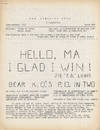![Word and Object. - [THE INDETERMINACY OF TRANSLATION - PRESENTATION-COPY OF QUINE'S MAIN WORK]](https://d3525k1ryd2155.cloudfront.net/h/958/996/1035996958.1.m.jpg)
Word and Object. - [THE INDETERMINACY OF TRANSLATION - PRESENTATION-COPY OF QUINE'S MAIN WORK]
by QUINE, WILLARD ORMAN VAN
- Used
- Hardcover
- first
- Condition
- See description
- Seller
-
Copenhagen, Denmark
Payment Methods Accepted
About This Item
1960. (N.Y., Wiley & Sons), 1960). 8vo. Orig. olive green full cloth w. gilt and black lettering and blindstamped seal to front board, and in orig. d.-j. Binding w. a bit of sunning and soiling to spine, and minor bumping to capitals and corners, otherwise nice and clean. With the rare original dust-jacket, in excellent condition, w. a tear to upper front hinge, no loss, and a few other small nicks and tears w. almost no loss. Some underlinings and marginalia in pencil. XV, (1), 294 pp. First edition, presentation-copy, of Quine's main work, in which he introduces the notorious indeterminacy of translation thesis. This is the most philosophical of all of Quine's works, and it has greatly affected the development of logic, philosophy of language and mathematics, and analytic philosophy in general.The presentation-inscription to front free end-paper reads as thus: "To Rod Firth/ with best regards./ Van". Roderick Firth was Quine's colleague as professor of philosophy at Harvard. He was chairman of the philosophy department at Harvard from 1957 until 1963. He earned a doctorate at Harvard in 1943, joined the faculty in 1953 and became Alford Professor of Natural Religion, Moral Philosophy and Civil Polity in 1962.It is in his "Word and Object" that Quine propounds his "indeterminacy of translation"-thesis, which became central in the development of philosophy of language. "Language is a social art. In acquiring it we have to depend on intersubjectively available cues such as to what to say and when. Hence there is no justification for collating linguistic meanings, unless in terms of men's dispositions to respond overtly to socially observable stimulations." (Preface p. IX).Quine bases his main thesis on his consideration of the linguist, who attempts to translate a hitherto unknown language. There are different methods that the linguist could apply as to the breaking down of sentences and distribution of function among the words. Quine reaches the conclusion that if any hypothesis of translation needs to be defended, this can only be by appeal to context, by determining what other sentences the language user would utter in the language that is unknown to the linguist. But even here the indeterminacy of translation sets in, because, according to Quine, any hypothesis can be defended, if only enough other hypotheses of other parts of the language are adopted. This indeterminacy of language also applies to the known languages, and even one's own, and thus Quine implies that there are no such entities as "meanings" of right and wrong. Quine thus denies any absolute standards in translating one language into another, but he admits that there are good and bad translation, -this is just not philosophically or logically relevant. Translation can be inconsistent with behavioral evidence, however and thus Quine propounds his pragmatic view of translation. "Neurath has likened science to a boat, which, if we are to rebuild it, we must rebuild plank by plank while staying afloat in it. The philosopher and the scientist are in the same boat. If we improve our understanding of ordinary talk of physical things, it will not be by reducing that talk to a more familiar idiom; there is none. It will be by clarifying the connections, causal or otherwise, between ordinary talk of physical things and various further matters which in turn we grasp with the help of ordinary talk of physical things." (P. 3 - § 9).
Synopsis
Word and Object is a 1960 book of epistemology by Willard Van Orman Quine. In it, Quine develops his thesis of the Indeterminacy of translation.
Reviews
(Log in or Create an Account first!)
Details
- Bookseller
- Herman H. J. Lynge & Son
(DK)
- Bookseller's Inventory #
- 38725
- Title
- Word and Object. - [THE INDETERMINACY OF TRANSLATION - PRESENTATION-COPY OF QUINE'S MAIN WORK]
- Author
- QUINE, WILLARD ORMAN VAN
- Book Condition
- Used
- Binding
- Hardcover
- Date Published
- 1960
Terms of Sale
Herman H. J. Lynge & Son
30 day return guarantee, with full refund including original shipping costs for up to 30 days after delivery if an item arrives misdescribed or damaged.
About the Seller
Herman H. J. Lynge & Son
Biblio member since 2017
Copenhagen
About Herman H. J. Lynge & Son
Herman H. J. Lynge & Son A/S was founded 1821 in Copenhagen, and has been a member of the Danish Antiquarian Booksellers Association (ABF) and International League of Antiquarian Booksellers (ILAB-LILA) since their beginning.
Glossary
Some terminology that may be used in this description includes:
- Marginalia
- Marginalia, in brief, are notes written in the margins, or beside the text of a book by a previous owner. This is very...
- Hinge
- The portion of the book closest to the spine that allows the book to be opened and closed.
- Spine
- The outer portion of a book which covers the actual binding. The spine usually faces outward when a book is placed on a shelf....
- Cloth
- "Cloth-bound" generally refers to a hardcover book with cloth covering the outside of the book covers. The cloth is stretched...
- Gilt
- The decorative application of gold or gold coloring to a portion of a book on the spine, edges of the text block, or an inlay in...
- First Edition
- In book collecting, the first edition is the earliest published form of a book. A book may have more than one first edition in...




